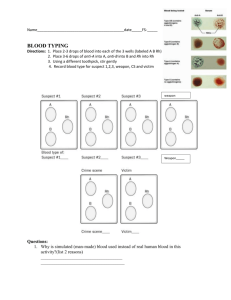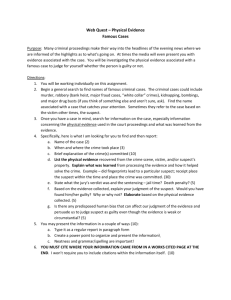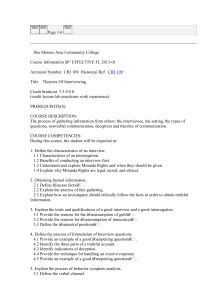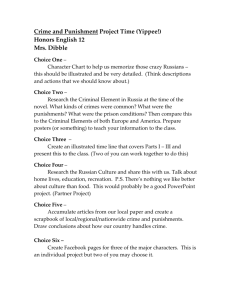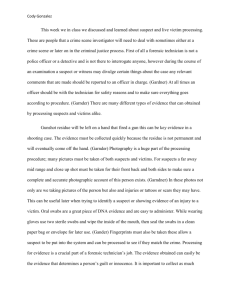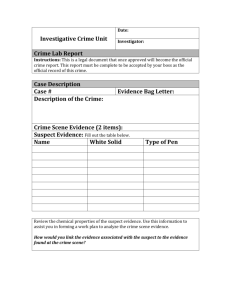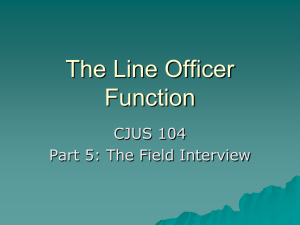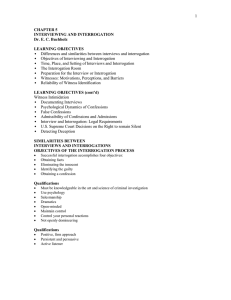Chapter 5
advertisement
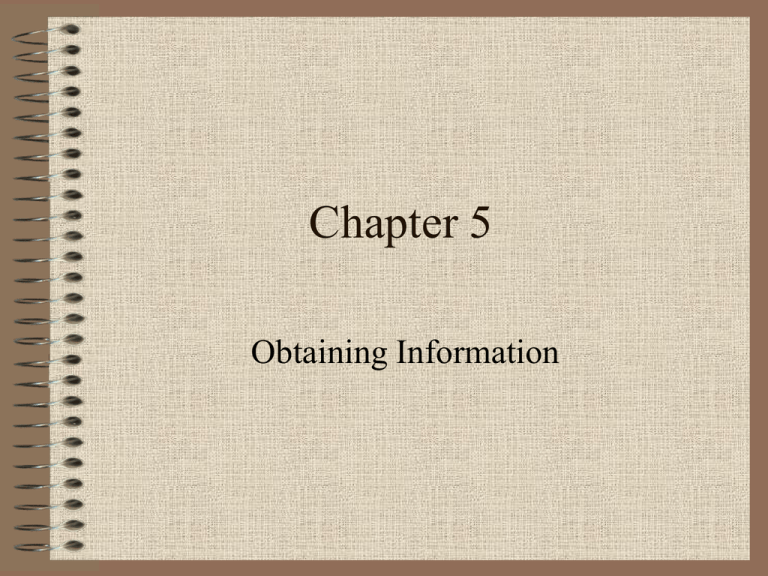
Chapter 5 Obtaining Information Three Primary Sources of Information 1. Reports, records and databases, including those found on the Internet 2. People who are not suspects in a crime, but know something about the crime or those involved 3. Suspects in the crime Reports, Records, and Databases • Local Resources: records and reports of your police department • Caller ID • All Phone Records • All State Information Sources, such as State Police, Department of Corrections and Motor Vehicles, Parole Commission, and State Liquor Authority. Federal Sources of Information • • • • • • • FBI National Crime Information Center U.S. Post Office Immigration and Naturalization Service Social Security Administration ATF DEA People with Information • Complainant – a person who requests that some action be taken • Witness – a person who saw a crime or some part of a crime being committed • Victim – a person injured by a crime • Suspect – a person considered to be directly, or indirectly connected with a crime • Informant – anyone who can provide information about a case but who is not a complainant, witness, victim, or suspect Interview and Interrogation • Interview – a process of obtaining information from people who have knowledge that might be helpful in a criminal investigation. • Interrogation – a conversation between an investigator and a suspect that is designed to match acquired information to the suspect and secure a confession. Characteristics of an Effective Interviewer/Interrogator • • • • • • • Adaptable Culturally Adroit Self-controlled/Patient Confident Optimistic Sensitive to Individual Rights Knowledgeable of the Elements of Crimes The Interview • • • • • Plan the interview in advance Select the time and place Begin the Interview Establish Rapport Network the Interview Interviewing Techniques • • • • Listen and Observe Direct Questions Indirect Questions Repetition Reluctant Interviewees • Logical Approach: based on Reason • Emotional Approach: addresses such negative feelings as hate, anger, greed, revenge, pride, and jealousy Cognitive Interview • Tries to get the interviewee to recall the scene mentally by using mnemonic techniques aimed at encouraging focused retrieval. 1. 2. 3. 4. 5. Introduction Open-ended narration Probing memory codes Review Close Enhancing Communication • Prepare for each interview in advance if time permits • Obtain your information as soon after the incident as possible • Be considerate of suspect’s feelings • Be friendly. Try to establish rapport • Use a private setting if possible • Eliminate physical barriers Enhancing Communication Continued • • • • • • Sit rather than stand Encourage conversation Ask simple questions Ask one question at a time Listen to what is said and how it is said Watch for indications of tension, nervousness, surprise, embarrassment, anger, fear, or guilt Emotional Barriers to Communication • Attitudes– the ingrained attitude that telling the truth to the police is wrong • Prejudices – concerning a person race, beliefs, religion, amount of education, and economic status • Fear – witnesses fear that criminals will harm them or their family • Anger • Self-preservation The Fifth Amendment • … no person shall be compelled in any criminal case to be a witness against himself. Miranda Warning • Suspects must be informed of their right 1. To remain silent 2. To have an attorney present 3. To have an appointed attorney if they cannot afford one 4. That anything they say may be used against them in court • Miranda applies when the suspect is being questioned and is in custody Waiving Miranda • A suspect can waive the rights granted by Miranda, but must do so intelligently and knowingly. • A waiver is accompanied by a written or witnessed oral statement that the waiver was voluntary. • Silence in itself is not a waiver. Other Miranda-type Decisions • • • • • Edwards v. Arizona U.S. v. Dockery Minnesota v. Murphy Berkemer v. McCarty Illinois v. Perkins Other Important Cases • N.Y. v. Quarles • Brewer v. Williams • Nix v. Williams Approaches to Interrogation • • • • • • Inquiring directly or indirectly Forcing responses Deflating or inflating the ego Minimizing or maximizing the crime Projecting the blame Rationalization
